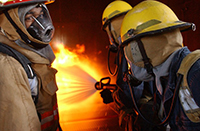 A fire in your business can quickly destroy your inventory, computer equipment and other assets. A fire also threatens your employees’ lives. Reduce your fire risk and be sure everyone gets out safely when you follow several fire safety tips.
A fire in your business can quickly destroy your inventory, computer equipment and other assets. A fire also threatens your employees’ lives. Reduce your fire risk and be sure everyone gets out safely when you follow several fire safety tips.
Provide Two Exits
Your business should provide at least two exits. They must unobstructed and clearly marked and labeled at all times.
Create a Detailed Evacuation Plan
It’s not enough to tell employees that they should escape from a burning building. You also need a detailed evacuation plan. It clearly marks the exact escape routes from anywhere on your property, including the number of steps to each exit, an important safety precaution if visibility is limited. Post the plan in prominent places around your building.
Practice Escaping the Building
Even the most detailed evacuation plan is worthless if you don’t practice it. Schedule frequent drills to ensure all your staff can escape safely no matter where they happen to be when a fire starts. Remember to make provisions for rescuing disabled workers and visitors, too, and assign someone to perform a headcount after the evacuation.
Install a Fire Suppression System
Many businesses need a fire suppression system in place before they can open. If your business doesn’t have this safety measure, consider implementing it. The system will activate and release fire-suppressing chemicals when the temperature rises, and they will also turn on if the emergency switch is turned on. Be sure to test your fire suppression system regularly to ensure it works properly.
Purchase Fire Extinguishers
Purchase and strategically place fire extinguishers throughout your building. Provide training to employees so that everyone knows how to operate an extinguisher if necessary.
Reduce Fire Hazards
There are several things you can do to reduce your fire hazards.
- Designate a smoking area away from flammable objects. Provide proper cigarette butt disposals.
- Remove paper, trash and other flammable items.
- Give electrical equipment, including computers and other office equipment, adequate breathing room so they do not overheat.
- Do not overload circuits.
- Limit the use of extension cords.
- Don’t bend or crush electrical cords.
- Unplug appliances when they’re not being used.
- Use, store and dispose of hazardous materials, including cleaning chemicals, safely.
- Report all fire hazards to maintenance immediately and encourage your staff members to do the same.
Never Ignore a Fire Alarm
Even if you suspect that the alarm is false, treat it as a real fire. Be sure your staff takes alarms seriously, too.
Fire safety is important. Follow these tips and discuss other safety strategies with your insurance agent. He or she will ensure you have adequate insurance coverage and assist you in maintaining a safe work environment.





